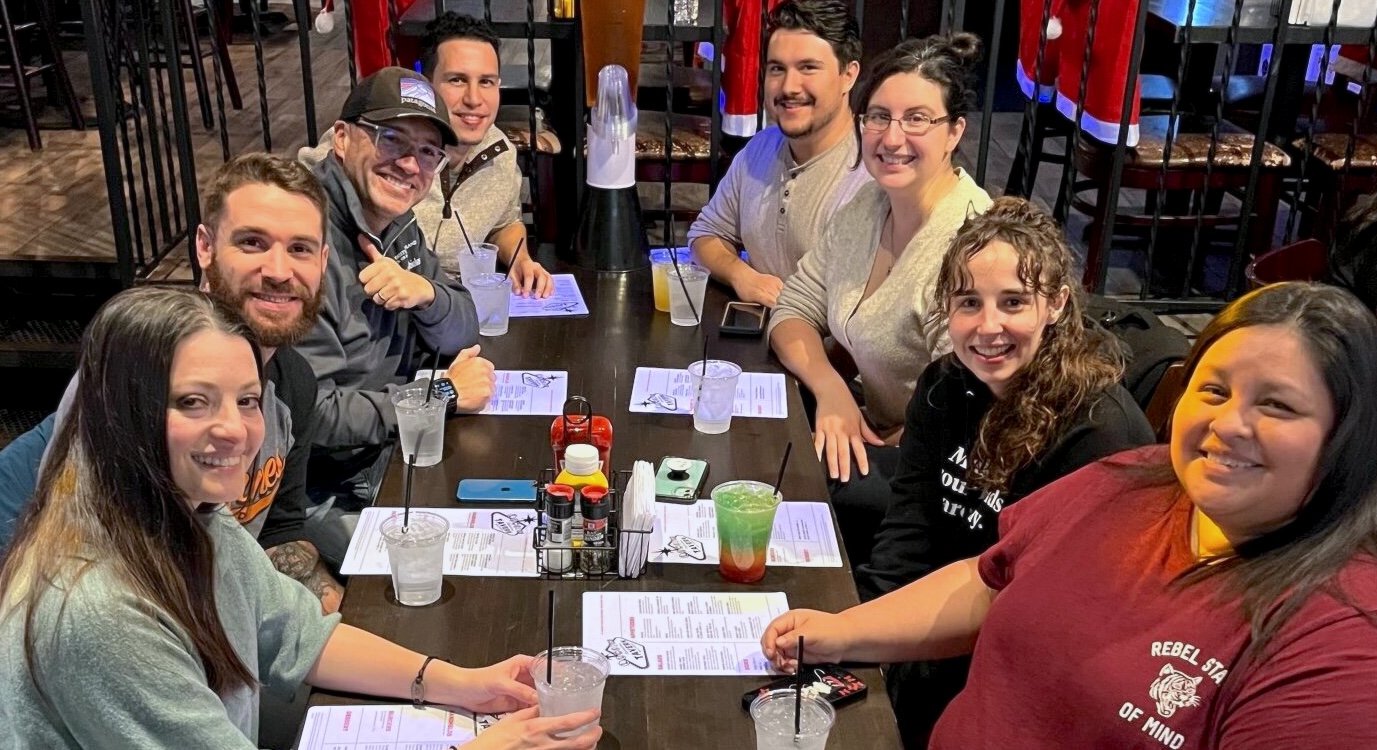People
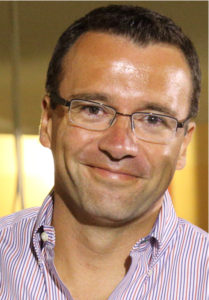
Joseph Cheer, PhD.
Principal Investigator
Joe’s main interests lie in the elucidation of the neurobiological effects of cannabinoids in both natural and drug-induced reinforcement. Joe graduated from Universidad de los Andes (Bogota, Colombia) with a B.S in Biology in 1996. He joined the Laboratory of Neurobiology and Experimental Microsurgery at the Colombian Neurology Foundation where he worked for 1 year investigating CNS regeneration using oncogene-tranfected cells and sciatic nerve co-grafts in motor cortex-lesioned animals. Joe received his Ph.D from the University of Nottingham (Neuroscience Section of the School of Biomedical Sciences) under the direction of Profs Charles Marsden and Dave Kendall and Dr Rob Mason. Joe’s graduate research focused on the behavioral and electrophysiological effects of cannabinoids.
Joe’s first postdoc (2000-2002) was spent in Sam Deadwyler’s laboratory (Wake Forest University School of Medicine) where he conducted research on multiple single-unit electrophysiology in freely moving organisms. Joe joined Mark Wightman’s lab as a post doc in fall 2002 at the University of North Carolina (Chapel Hill). There, he established the use of a microelectrode that allows for the simultaneous measurement of single-unit activity and dopamine release via fast-scan cyclic voltammetry.
Joe is currently a tenured professor at the University of Maryland School of Medicine, where he directs undergraduate, graduate and postdoctoral projects related to several neurophysiological and neurochemical aspects of endogenous cannabinoid signaling in intact systems.
In his spare time Joe likes to enjoy the outdoors with his two daughters, his wife and his rescue dog, Rusty.
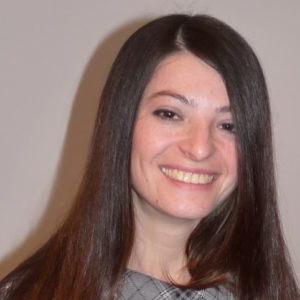
Iness Gildish, M.S.
Laboratory Manager
Neurobiology and psychology became Inna’s main interest during high school and she knew she wanted to be a researcher in this area. Inna earned her B.S in Molecular Bio-Chemistry from Technion, Haifa, Israel in 2008. During her studies at the Technion she met prof. Kobi Rosenblum whose research in taste learning and memory mechanism dazzled her so she decided to continue her education in his lab.
A year later she joined prof. Kobi Rosenblum’s lab in Haifa University as a M.S. student. During this time she worked with transgenic mice to determine how regulation of translation elongation involved in taste memory formation and its consolidation. By using behavioral, molecular, and imaging techniques, she was able to make progress in understanding the relationship between regulation of protein synthesis during memory consolidation and behavioral output. Inna joined the Cheer Lab in December 2011 to learn about electrochemical and neurophysiological recordings in behaving animals, and to better understand the endocannabinoid system.
Inna’s future goals are to complete a Ph.D. in neuroscience. In her spare time she enjoys reading, watching movies, photography and traveling.

Carlos F. Cardozo, PhD.
Postdoctoral Fellow
Carlos obtained his undergraduate degrees in Electronic Engineering (2010) and Biology (2014) from Universidad del Valle in Cali, Colombia. His profound interest in Physiology and Neurobiology inspired him to pursue a PhD in Biomedical Sciences at the same institution. Under the guidance of Prof. Juliana Rengifo Gomez, his PhD thesis focused on the role of O-GlcNAcylation in brain ischemia events using a rat model. Carlos also served as a lecturer in human physiology at Universidad Icesi and Universidad Javeriana-Cali for several years, where he discovered a passion for teaching.
Driven by his desire to understand brain function, particularly in relation to motivation and addiction behavior, Carlos joined Prof. Joseph F. Cheer’s laboratory in 2024. He is currently engaged in research aimed at evaluating the effects of reducing huntingtin protein on motivational behavior and motor performance in a mouse model of Huntington’s disease.

Antonio Figueiredo, PhD.
Postdoctoral fellow
Antonio graduated in 2016 from the University at Buffalo with a B.S. in Biological Sciences, concentrating in Neuroscience and Cellular & Molecular Biology, and a B.A. in Chemistry. Upon graduating, he accepted a research position at the University at Buffalo Research Institute on Addictions under Dr. Panayotis Thanos. Antonio’s research investigated the role of fatty acid-binding proteins as transporters of endocannabinoids. This experience helped shape Antonio’s interest in examining the intersection of endocannabinoids and disorders of motivation.
To further his training, Antonio joined the University of Maryland School of Medicine’s Science Training for Advancing biomedical Research Post-baccalaureate Research Education Program (STAR-PREP). Under the guidance of Dr. Joseph Cheer, Antonio learned various techniques to measure neuronal signaling and neurotransmitter release in vivo. This experience continued to build on his understanding of motivation and reward systems.
Currently, Antonio is a Ph.D. candidate under Dr. Cheer’s mentorship. Here, he continues his research investigating the role of cannabinoid type 1 receptors on hippocampal-cholinergic terminals in regulating motivation. Following his Ph.D. training, Antonio wishes to pursue a post-doctorate fellowship and become a principal investigator.
Carlos Medina Saldivar, MSc.
Graduate student
Antonio graduated in 2016 from the University at Buffalo with a B.S. in Biological Sciences, concentrating in Neuroscience and Cellular & Molecular Biology, and a B.A. in Chemistry. Upon graduating, he accepted a research position at the University at Buffalo Research Institute on Addictions under Dr. Panayotis Thanos. Antonio’s research investigated the role of fatty acid-binding proteins as transporters of endocannabinoids. This experience helped shape Antonio’s interest in examining the intersection of endocannabinoids and disorders of motivation.
To further his training, Antonio joined the University of Maryland School of Medicine’s Science Training for Advancing biomedical Research Post-baccalaureate Research Education Program (STAR-PREP). Under the guidance of Dr. Joseph Cheer, Antonio learned various techniques to measure neuronal signaling and neurotransmitter release in vivo. This experience continued to build on his understanding of motivation and reward systems.
Currently, Antonio is a Ph.D. candidate under Dr. Cheer’s mentorship. Here, he continues his research investigating the role of cannabinoid type 1 receptors on hippocampal-cholinergic terminals in regulating motivation. Following his Ph.D. training, Antonio wishes to pursue a post-doctorate fellowship and become a principal investigator.
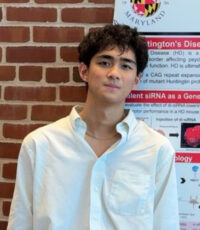
Alejven E. Sarmiento
Undergraduate volunteer
Al is a senior at the University of Maryland College Park, currently on the pre-med track with a major in Neurobiology and Physiology.
Since he joined the lab, Al proactively supports distinct projects to enhance his learning of neuroscience.
At College Park he leads teaching sections for organic chemistry. Al is also a member of his local fire department as a junior EMT and volunteers with various organizations.
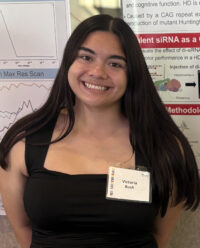
Victoria Bush
Undergraduate volunteer
Victoria is a junior at the University of Maryland, College Park majoring in Physiology and Neurobiology on the pre-medical track. She is interested in exploring ways to improve healthcare through research and community service.
In addition to her academic work, Victoria serves her community as a Firefighter and EMT with two volunteer fire departments. She currently holds the positions of EMS Sergeant and Membership Coordinator at the Ellicott City Volunteer Fire Department and helps teach and mentor students in the EMT Pathways Program at the Applications and Research Laboratory.
She also works as a manager at a local ice rink and plays ice hockey in her free time.
Interested in joining the lab? Contact us about potential openings.
Alumni
| Years | Alum | Current Position |
|---|---|---|
| 2009 – 2011 | Carien Lansink, Ph.D. | Associate Professor, University of Amsterdam |
| 2009 – 2012 | Giovanni Hernandez, Ph.D. | Jasper Research Fellow, University of Montreal |
| 2010 – 2013 | Roger Cachope, M.D. | Director of Systems Neurobiology, CHDI, adjunct Assistant Professor, UMSOM |
| 2010 – 2013 | Erik Oleson, Ph.D. | Associate Professor, University of Colorado, Denver |
| 2013 – 2014 | Thibaut Sesia, Ph.D. | Group Leader, University of Cologne |
| 2013 – 2019 | Jen Wenzel, Ph.D. | Assistant Professor, University of San Diego |
| 2014 – 2020 | Dan Covey, Ph.D. | Assistant Professor, Lovelace Research Institute, University of New Mexico |
| 2014 – 2021 | Natalie Zlebnik, Ph.D. | Assistant Professor, University of California, Riverside |
| 2020 – 2025 | Miguel A. Lujan Perez, M.Sc. Ph.D. | Assistant Professor, University of Illinois College of Medicine, Chicago |

